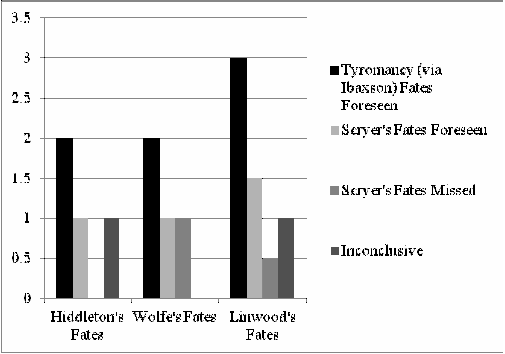MAGUS’S NOTE
My colleagues will note that in writing this paper I have not attempted to divide the research from myself, as can be noted here with my use of “I” and “my.” Unlike some individuals whom I will not name, I have never attempted to pass blame; I take full responsibility whenever it is deserved. Therefore, and because the use of the third person and passive speech loses the vibrancy and verve the subject of tyromancy deserves, I have elected to forgo the more pedantic and tedious tone such works more frequently employ.
CONSPECTUS
This report discusses whether tyromancy, divination using cheese, might be more effective and accurate in its predictions than the more popular methods of scrying through reflective surfaces, such as mirrors or bodies of water. Specifically, the report considers whether tyromancy is more effective at divining colleagues’ misfortunes. While the literature on tyromancy must be greatly expanded, this study’s results indicate that indeed, cheese might tell us more than the average crystal ball, mirror, or pool of water.
PREAMBLE
Much has been written about cheese: how to make it, including the specifics necessary to produce particular varietals; its healthfulness (or lack thereof, depending upon whom one consults); with which drink or other foods it pairs best.
Much has also been written about divination: which method might provide the most accurate predictions; the meditative state in which one must be to “see the clearest skies”; and whether particular persons might be better suited toward one method than another.
This author feels that scrying though a reflective surface–the divination method favored particularly at Wintervale University–has been given excessive favor over the noble art of tyromancy, or divination through the study of cheese curds. This is exemplified by tyromancy’s sublimation into the Animalistic Magic Department at Wintervale, a structure re-ratified by certain personages whose names have no bearing on this study. Yes, cheese does come from milk, which comes from animals, but tyromancy is too easily lost among the reading of paw prints and entrails. The budget won’t keep us in milk and rennet, let alone replace the fifty-year-old churns!
This should not be. Not only is tyromancy more functional than reflective scrying–one can eat the cheese previously used to predict the future, but one may not do so with mirrors or crystal balls, unless one likes the idea of shards of glass cutting up one’s intestines–but this author believes it is more effective, with more consistent and more-often correct predictions. In this paper, I will elucidate the trials I undertook order to give tyromancy its just due, and report on my findings.
PRACTICE
Materials
• 3 lbs Roquefort cheese
• 3 listen-in bugs
• Magus Minerva Hiddleton’s heirloom mirror
• Magus Theodore Linwood’s crystal ball
• Wintervale University’s general-use scrying pool
• A small sample of Magus Septima Wolfe’s skin scrapings
Participants
I myself acted as the tyromancer.
Magi Minerva Hiddleton, Theodore Linwood, and Septima Wolfe of Wintervale University participated in my study, although due to the nature of my experiment, it was necessary to hide their participation from them.*
I also enlisted the help of two of my co-magi in the Animalistic Magic Department at Wintervale, Associate Magus Beatrice Myne and Undermagus Leopold Mixon.
*Some may think I selected Magi Hiddleton, Linwood, and Wolfe due to their loudly aired ill-opinions regarding tyromancy, or that I harbored an unscholarly personal vendetta against them. In fact, I selected them because they are exemplary practitioners of their chosen scrying methods. It would have been unfair to match my own immense tyromantic powers against lesser magi.
Conduct
One potential issue with attempting to prove the efficacy of any divination method is the potential timeline involved; I could not afford to wait years to discover if my tyromantic predictions were true. Therefore, I required relatively immediate results, and ones that I could not know myself, so as to avoid skewing the outcome. Thus I engaged the aid of my friends Beatrice and Leopold to prank Magi Hiddleton, Linwood, and Wolfe.* I emphasized strongly that since I, the practicing tyromancer, could not be biased into predicting the exact pranks, they were not even to hint what they might plan for Magi Hiddleton, Linwood, and Wolfe. Nor could they tell me exactly when they planned to enact their pranks, albeit–again due to the time constraints–I told them the pranks could not occur more than two months out.
However, since this paper is on the efficacy of tyromancy over reflective scrying, I needed a means of tracking the latter efforts. I am no great scryer; my strengths lie with coagulated milk. Plus, I could not risk an unconscious desire to “fail” at these other scrying methods and therefore invalidate the results. I could not act as a scryer, and nor would it have been proper for Beatrice or Leopold to do so.
Thus, I set about employing a means of monitoring the scrying methods employed by Magi Hiddleton, Linwood, and Wolfe, viewing respectively: a crystal ball, an heirloom mirror, and the general-use scrying pool on the grounds of Wintervale University. To maintain the blind nature of my study, Magi Hiddleton, Linwood, and Wolfe could not know of their participation. Naturally, I checked out three listen-in bugs from Wintervale’s Security Department, with the intent of placing one nearby each Magus’s chosen scrying surface.
Considering that Magi Hiddleton and Linwood keep their crystal ball and mirror in their respective rooms, this was initially somewhat challenging. However, I tracked the schedule of each and knew when he or she was to be out of his or her tower room for a suitable length of time. After feeding the two listen-in bugs a bit of my own choice Roquefort, I planted them where they’d be able to listen-in on the Magi’s scrying sessions.
The general-use scrying pool proved more difficult. I am sure that Magus Wolfe would prefer her own private pool, but that is a decision for administration. It has therefore become widely known that in addition to her regular teaching duties, she scries at the general-use pool for her own private matters, usually at odd hours when she can expect the students to be abed. I did not want the listen-in bug tracking all scrying sessions; that would have overwhelmed me with students’ amateur attempts. It became necessary to sneak into Magus Wolfe’s rooms, whereupon I was able to collect some skin scrapings off her pumice foot stone and feed them to the last listen-in bug, along with some Roquefort. This meant I still captured Magus Wolfe’s demonstration scrying, but at least weeded out the students’ feeble attempts.
I experienced momentary discomfort that my subterfuge would be discovered, ruining my experiment, but happily Magi Hiddleton, Linwood, and Wolfe are self-involved. That they never suspected what I had done came clear in the trial of The Province of Wintervale vs. Cresivar Ibaxson, in which I was legally bound to divulge my methods.
With all listen-in bugs in place, I set about my own plan: Each morning at dawn, I would take my morning Roquefort and engage in tyromancy, directing my attention toward Magi Hiddleton, Linwood, and Wolfe, and seek to determine what ill fates might befall them, and whether I could do so in a manner more expedient and accurate than their various methods of reflective divination.
* Accusers have made much of Beatrice’s and Leopold’s so-called “motivation” in helping me. Though it has no bearing on my paper, I understand that some readers may also consider this matter of some import. I therefore write now what I stated at trial: There is no greater motivation than that of human curiosity and inquiry.
OUTCOME
Over the course of the two-month period, I foresaw seven fates.
For Magus Hiddleton: a most ignoble defeat at Wintervale University’s annual mirror toss; a poisoning of her morning crumpet with a laxative in advance of her keynote speech on Weasels as Familiars at the annual Witches’ Compendium, resulting in a rather embarrassing moment on-stage;
For Magus Wolfe: falling through a rotted stair as she descended into the University’s dungeon; a case of head lice after her hair powder was infested with their eggs;
For Magus Linwood: plague rats in his chambers; flubbing his courtship of Magus Hiddleton when his rat poison nearly killed her weasel familiar*; and the extreme misfortune of contracting bubonic plague.
My review of the listen-in bugs showed that Magi Hiddleton, Linwood, and Wolfe foresaw three and one half of these fates.**
Magus Hiddleton foresaw the poisoning of her crumpet. She skipped eating her crumpet the morning of her keynote speech and thereby avoided that particular ill fate. She did not foresee her defeat at the mirror toss, but I learned later that she prefers her performance to be a surprise to herself. Henceforth, I hear, she will check for “tampered equipment,” but for the purposes of my study, I must consider this instance inconclusive.
Magus Wolfe foresaw the head lice. Feeling rather irked by the splint she was forced to wear following her accident with the rotted stair, she took the extreme precaution of throwing out her hair powder, along with that of all the other magi whose chambers share her floor.
Magus Linwood foresaw his misstep in his courtship of Magus Hiddleton and took adequate precautions to clear his chambers of rat poison. While he did foresee the rat infestation, it left him with too little time to enact preventative, vs. corrective, measures, and he missed the unfortunate detail that the rats were infected with plague.*** This meant he didn’t take adequate precautionary measures in handling the specimens. I must consider his foreseeing only partially effective.
I will allow that Linwood might have also foreseen his contracting the plague and his eventual demise; however, he located my listen-in bug while clearing his chambers of the rat poison, so results here are also inconclusive.
*I’ll note that I was unaware of Linwood’s courtship prior to my tyromancy. Though having no direct bearing on my planned research, this additional prediction further proves tyromancy’s efficacy.
**Among the three of them, Magi Hiddleton, Linwood, and Wolfe foresaw fourteen other fates besides, but as those had nothing to do with their misfortune, they are irrelevant here. Nonetheless, let it be known that I saw six additional irrelevant fates, which is higher than the average of the fourteen fates divided among Magi Hiddleton, Linwood, and Wolfe.
***Accusers have also questioned me as to whether Leopold, as Wintervale University’s rat expert, may have deliberately infected the rats with plague. While some people may find “contagion vectors” and “disease epidemics” interesting or even important, how the rats contracted plague has no bearing on my paper.
PREFACE TO THE PALAVER
To those critics who have stated in person to me and who might believe, after reading this paper, that I should have warned Linwood of the future I foresaw, and that I should have warned the University of imminent plague outbreak, I remind you of the importance of research. The pursuit of knowledge will at times have consequences. We must be willing to bear them if we are to progress in our understanding of tyromantic, and other, arts.
PALAVER
I hope my paper makes clear just how crucial it is to allocate increased funds toward the field of tyromancy in general and at Wintervale University in particular. Though I, Beatrice, and Leopold are now under investigation for willful misconduct leading to death*, I believe the importance of our research speaks for itself. The results clearly show that tyromancy is a viable option of divination, and may in fact be more reliable and accurate than scrying through a reflective surface. For the visually inclined, I have created a chart summarizing this point:
Note how the bars representing the use of tyromancy are higher than all the others.
Yet literature on the efficacy of tyromancy remains sparse, and my study cannot stand alone. Clearly, more research remains to be done on the efficacy of tyromancy over reflective scrying methods, and indeed, the field of study must be expanded past the imminent misfortunes of colleagues, and performed over longer periods of time. Tyromancy must be attempted with the variety of cheeses available to us. With suitable funding for cheese-making and subsequent trials, we might decipher which cheeses best lend themselves to tyromancy; what effect individual ingredients have upon the resultant visions; or if certain cheeses may make up for the deficits of tyromancers weaker than myself. Further, double-blind studies incorporating bean curd may also weed out charlatans and false tyromancers.
In addition, we, as magi and researchers, must turn our eyes toward the long-term: Might tyromancy be more effective than reflective scrying when searching for the latest Chosen One? Could it not reveal to us forthcoming war tyrants, enabling us to take action against them before they rise to power? And, since so many people keep harping on the matter, could it not be effective in warning us of widespread disease?**
I leave such discoveries to other discerning tyromancers.
*Posthumously, in the case of Leopold.
**Of course, my experiences have already proved tryomancy’s effectiveness in predicting disease outbreak, but reporting of such findings–whether at time of publication or as a kindly warning to the general populace–are more appropriate in a study devoted to that matter.
RECOGNITION
I thank my friends, Beatrice Myne and Leopold Mixon, for their willingness to help facilitate my study.
Beatrice, I plan to visit you soon. Indeed, the curds indicate I will have before this paper sees publication! Condolences again on your continued difficulty in procuring bail.
Leopold, you will not be forgotten. I promise to one day retrieve your bones from the mass pyre. They will have a proper burial, and I will honor your grave yearly with cheese platters. My fondest regards to the plague-free survivors of your family.
MAGUS’S FINAL NOTE
This paper in no way constitutes any admission of guilt on my part or on that of Associate Magus Beatrice Myne and Undermagus Leopold Mixon in the matter of Magus Theodore Linwood’s untimely demise. Nor does it constitute guilt in the resultant epidemic that took the lives of nearly one-tenth of Wintervale University’s student body and staff, or of their infected families. Pending the findings of The Province of Wintervale vs. Cresivar Ibaxson, I remain innocent within the eyes of the law, just as I remain confident that tyromancy is indeed the best whey to divine, understand, and prepare for the future–thanks to the power of those sweet, tangy curds.
© 2018 by Amanda Helms
Author’s Note: This story came out of a seed from the Codex Writer’s Group that read simply “tyromancy: divination via the coagulation of cheese.” I didn’t use it for the particular contest it was associated with, because I wanted to write Something Serious. The idea of tyromancy stuck with me, though, and I wondered about the type of person who would attempt to use it, and how they would feel if people constantly belittled their chosen profession. The bungled scientific paper and even worse approach to the scientific method developed as I considered how this person might struggle to make clear that their work is not pointless, dammit. And thus was Cresivar’s “scientific study” born unto the world.
 Amanda Helms is a science fiction and fantasy writer whose fiction has appeared in Intergalactic Medicine Show, Daily Science Fiction, Cast of Wonders, and the Cackle of Cthulhu anthology. She tends to be funnier in her writing than in person, but don’t hold that against her. She lives in Colorado with her dog, and new husband. She blogs infrequently at amandahelms.com and tweets with a smidgen more frequency @amandaghelms.
Amanda Helms is a science fiction and fantasy writer whose fiction has appeared in Intergalactic Medicine Show, Daily Science Fiction, Cast of Wonders, and the Cackle of Cthulhu anthology. She tends to be funnier in her writing than in person, but don’t hold that against her. She lives in Colorado with her dog, and new husband. She blogs infrequently at amandahelms.com and tweets with a smidgen more frequency @amandaghelms.
If you enjoyed the story you might also want to visit our Support Page, or read the other story offerings.


